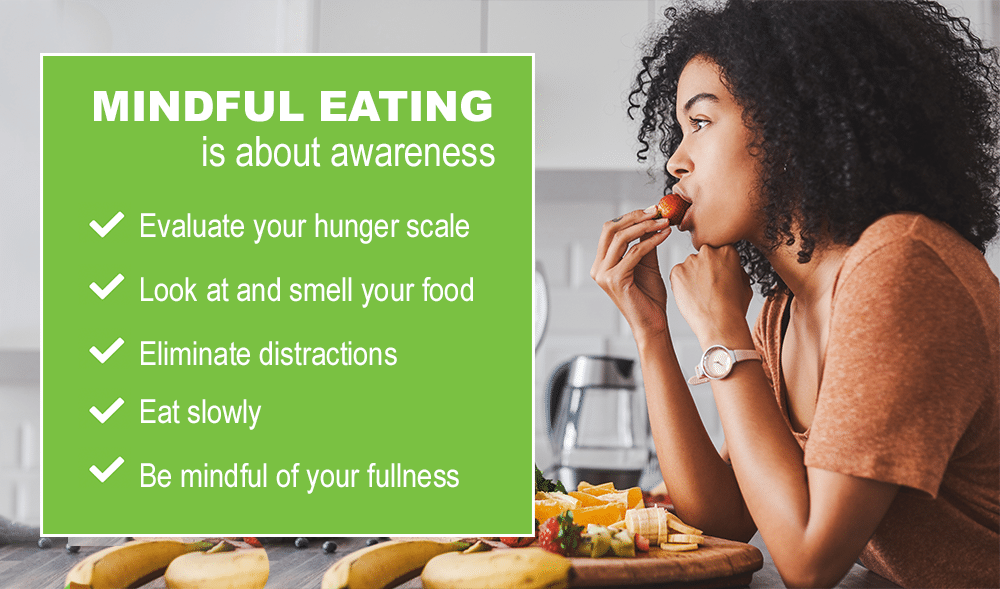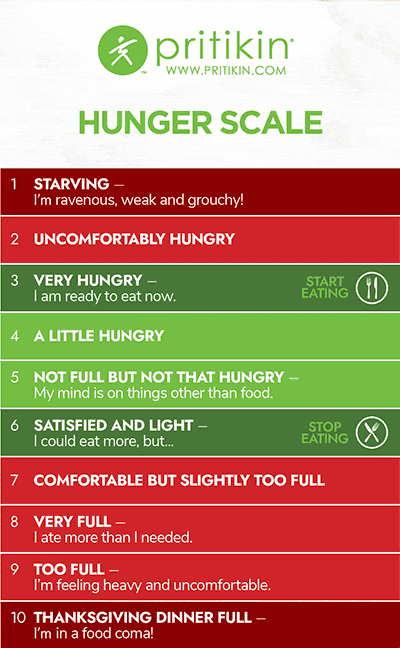How to Eat Mindfully and Lose Weight
Your Guide to Mindful Eating
In this guide to mindful eating, let the knowledge of clinical researchers, psychologists, and registered dieticians help you adopt a lifelong strategy that’s a healthier way of living. Mindful eating is an effective strategy for weight loss. Evidence is growing, including results from a randomized trial in which researchers lead 80 adults from North Carolina through mindful eating programs and noted it led to weight loss.
Yet, perhaps what makes mindful eating most valuable is how it makes healthy eating easier. Yes, mindful eating actually makes eating healthy easier, suggests findings from a study published in the British Medical Journal Open. A small group of overweight or obese adults spent a few hours each week learning the theoretical aspects of mindful eating and had opportunities to practice them amongst the support of the clinical psychologists and nutritional experts. After this guidance to mindful eating, the adults were less likely to eat when feeling lonely or irritated and found it less difficult to resist foods that were not part of their healthy eating plan.

How to Eat Mindfully
- Start Your Meal by Evaluating Your Hunger Scale
- Look at and Smell Your Food
- Eliminate Distractions
- Eat Slowly
- Be Mindful of Fullness Sensations
Mindful Eating Starts with Evaluating Your Hunger
Mindful eating starts with taking a moment to listen to your body. Healthy lifestyle experts at the Pritikin Center, in Miami, Florida, use a special measurement, called the Hunger Scale, to help you determine when to eat and how much to eat to achieve sustainable weight loss.
Can Mindfulness Help You Stop Binge Eating?
You’re not alone. Estimates suggest that people struggling to lose weight who are seeking help, commonly (between 25-30%) suffer from depression or other psychological disorders, leading to emotional and binge eating. That’s no surprise, as evidence links restrictive diets, commonly used in attempts to lose weight, as significant contributors to binge eating. Findings show it is possible to reduce the number of binge-eating episodes and improve depressive feelings with the use of mindful eating strategies.
Looking at Your Food is Part of Mindful Eating
Find a comfortable place to sit and enjoy taking in the sights and smells of the food you’re eating. Looking at your food and smelling it actually stimulates the digestive system, getting your body ready to be able to better process the incoming nourishment. You’ve probably noticed this very process, the last time you looked at delicious food and your mouth watered. That’s saliva being made in preparation for you to eating.
Healthy lifestyle experts at the Pritikin Center, in Miami, Florida, use a special measurement, called the Hunger Scale, to help you determine when to eat and how much to eat to achieve sustainable weight loss.
Eliminate Distractions While You Eat to Help Weight Loss
Avoiding distractions is the best way to be more mindful of how fast you are eating. Studies have found a wide variety of factors can distract you from eating mindfully: computer games, listening to a story, background music, or other electronic device. In fact, eating in competition with other tasks has been shown to increase food intake – about 15% more calories and higher consumption of fat.
Do Fast Eaters Gain More Weight?
Being a speedy eater may be a reason you or someone you love, is struggling to manage body weight. Findings from a research study propose that people who eat faster are at higher risk for weight gain and obesity. Published in the journal, Clinical Obesity, the study suggests eating faster puts you at a higher risk of obesity due to the delay in realization of fullness, compared to when you eat slowly. The reason is explained by healthy living expert, Registered Dietician, Kimberly Gomer, Director of Nutrition at the Pritikin Longevity Center and Spa; “Slow down – it takes 15 to 20 minutes for the stomach to signal the brain that you are full.”
Can You Lose Weight with Mindful Eating?
Digging your fork into that delicious food, you stuff it into your mouth, quickly chew it into bits., and as you’re swallowing, you already have the next forkful waiting impatiently by your lips. If that sounds like you, you may be eating too quickly. That mouthful you just swallowed has a long way to go down your throat – down the length of your esophagus and into your stomach takes a while. In your stomach, you have stretch receptors that sense food and send a message to your brain to tell you, “Thanks, I’m good now – you can stop eating.” However, you may not have heard your stomach if you are eating while distracted by phones, the news, your computer work, or even driving. The average person takes 15 to 20 minutes to get a signal from their stomach. How many times have you taken that long to eat a meal? Worse, how often have you quickly returned to get second helpings, before waiting long enough to allow your stomach to send you a message about how full you really are?
How to Eat Slowly
“Slow down – it takes 15 to 20 minutes for the stomach to signal the brain that you are full,” notes Kimberly Gomer, R.D.
If you’re looking for some creative ways to slow down how fast you eat, Registered Dietician, Kimberly Gomer, the Director of Nutrition at the Pritikin Longevity Center and Spa, has some fun suggestions, including eating with your non-dominate hand or try using chopsticks. Obviously, neither of these are recommended if you are wearing nice clothes or if you’re eating soup. (Perhaps when trying these fun options, have a few napkins handy.) Another idea, to help you eat slowly, (even though to some it may sound like asking you to dive right off the deep end) is to turn off your smartphone. In a 2020 study, researchers reported that using smartphones when eating increases the number of calories consumed. Mindful eating is easier when you put down your smartphone.
Mindful Eating Helps You Feel Full
When you’re eating mindfully, at an unrushed pace, without distractions, you’ll find it much easier to enjoy the sensation of fullness, because you’ll be ready to hear those cues from your body. The human body is impressive and does a great job communicating with you about its needs and feelings – if you’re willing to slow down and tune in, the messages are loud and clear. Try eating your next meal in an undistracted environment, taking your time, and listening to your body’s hunger cues. You may be incredibly impressed by how much enjoyment you can have when you eat mindfully.
Pritikin Experts on Mindful Eating
“It’s not just what you should eat, but how you should eat,” explains Kimberly Gomer, R.D.
Part of the renowned Pritikin Nutrition Program is a special luncheon, called Mindful Eating, led by Registered Dieticians, it’s a unique opportunity to put your skills to the test. As a Pritikin guest, you discover for yourself, what it feels like to eat mindfully, with the support of a leading expert in the field. This special luncheon highlights tools and habits guests can use to slow down their eating and become more mindful of their body’s messages, to enable them to eat better. “It’s not just what you should eat, but how you should eat,” explains Gomer. “The luncheon is an experience to put your understanding of the Hunger Scale into use and practice eating in a mindful way.” As a Registered Dietician, Kimberly practices what she preaches, in fact, living the healthy lifestyle taught at the Pritikin Center is so inspiring that even the staff comment that it’s hard not to take Pritikin theories home with you.
Are you ready to start eating better and living healthier?
Come to the Pritikin Center in Miami, Florida for a few weeks of luxury, in a tropical vacation to learn from the experts and take home a healthy lifestyle that will last a lifetime.

To Learn More About a Stay at Pritikin
Call 888.254.1462 or
References
- Associations between number of siblings, birth order, eating rate and adiposity in children and adults. Clinical Obesity 2021 Jan 12; 11(3): e12438.
- Using smartphones when eating increases caloric intake in young people: an overview of the literature. Front Psychol 2020; 11:587886.
- A systematic review and meta-analysis examining the effect of eating rate on energy intake and hunger. Am J Clin Nutr 2014 Jul; 100(1): 123-151.
- Eating attentively: a systematic review and meta-analysis of the effect of food intake memory and awareness of eating. Am J Clin Nutr 2013 Apr; 97(4): 728-742.
- Efficacy of a mindful-eating programme to reduce emotional eating in patients suffering from overweight or obesity in primary care settings: a cluster-randomised trial protocol. BMJ Open 2019; 9(11): e031327.
- Are common measures of dietary restraint and disinhibited eating reliable and valid in obese persons? Appetite. 2015 Apr; 87():344-51.
- Mindful eating and weight loss, results from a randomized trial. J Fam Med Comm Health 2018 June; 5(3): 1152.




